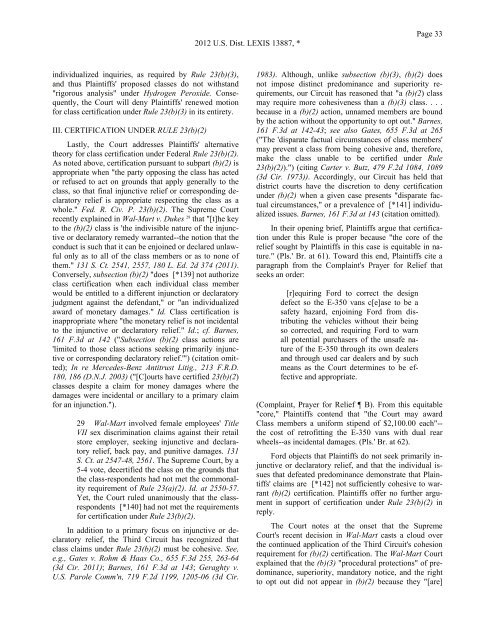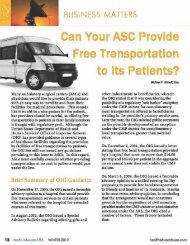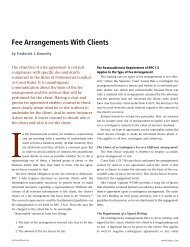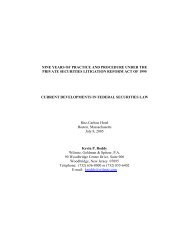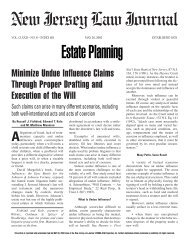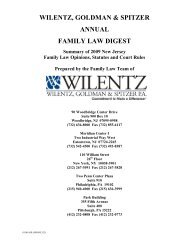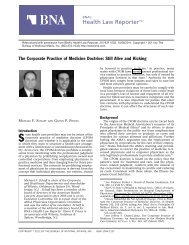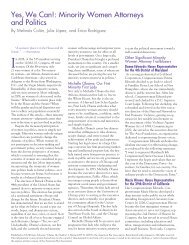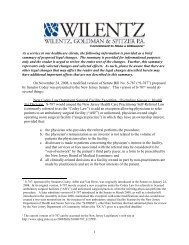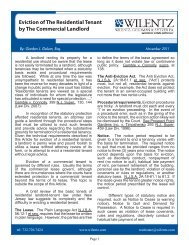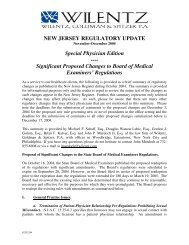2012 U.S. Dist. LEXIS 13887, *Page 3227 <strong>In</strong>deed, it is undisputed that Bar<strong>re</strong>tt negotiateddown the price of his used 1997 E-<strong>350</strong> vanin the same conversation that he told the salesagent that the van should not be driven by an inexperienceddriver, and that he knew of a priorinstance whe<strong>re</strong> an E-<strong>350</strong> van had experienced arollover. July 9 Opinion, 2010 U.S. Dist. LEXIS68241, 2010 WL 2813788, at *69 (citing Bar<strong>re</strong>ttDep. at 48:11-49:13, 106:16-23).The <strong>Co</strong>urt further notes that Plaintiffs' proposedclasses appear to include a large number of consumerswhose claims would be time-bar<strong>re</strong>d under the <strong>re</strong>levantstatute of limitations. <strong>Ford</strong> argues that the statute of limitationswill bar the vast majority of proposed New York,[*134] Pennsylvania, and Georgia warranty-claim classmembers, because the named Plaintiffs from these jurisdictionsdid not join this MDL until <strong>No</strong>vember 2008 (see<strong>Co</strong>nsent Order of <strong>No</strong>vember 5, 2008, Doc. <strong>No</strong>. 150), andthese jurisdictions do not allow cross-jurisdictional tolling.(See, e.g., <strong>Ford</strong>'s Resp. Br. at 38). <strong>Ford</strong> <strong>re</strong>asons that,courtesy of the four-year limitations period and theUCC's strict accrual rule for warranty claims (tender ofdelivery), see, e.g., Ga. <strong>Co</strong>de Ann. § 11-2-725, putativeclass members for these claims must have purchased and<strong>re</strong>ceived their qualifying E-<strong>350</strong> vans no later than <strong>No</strong>vember2004. <strong>Ford</strong> further <strong>re</strong>asons that some of theseclasses would be deprived of their class <strong>re</strong>p<strong>re</strong>sentatives,because certain named Plaintiffs purchased their E-<strong>350</strong>vans befo<strong>re</strong> this date. These arguments fail to account forthe class tolling doctrine <strong>re</strong>cognized by the Sup<strong>re</strong>me<strong>Co</strong>urt in American Pipe & <strong>Co</strong>nstruction <strong>Co</strong>. v. Utah, 414U.S. 538, 94 S. Ct. 756, 38 L. Ed. 2d 713 (1974) andCrown, <strong>Co</strong>rk & Seal <strong>Co</strong>. v. Parker, 462 U.S. 345, 103 S.Ct. 2392, 76 L. Ed. 2d 628 (1983). This tolling doctrine<strong>re</strong>cognizes that "the commencement of a class actionsuspends the applicable statute of limitations as to allasserted members of the class who would have been parties[*135] had the suit been permitted to continue as aclass action," and that the action "<strong>re</strong>mains tolled for allmembers of the putative class until class certification isdenied." Crown, <strong>Co</strong>rk & Seal, 462 U.S. at 353-54. Becausethe original action in this MDL, filed in August2003, sought a nationwide class (see Doc. <strong>No</strong>. 1 7), itwould appear that this doctrine tolled the limitations periodsfor other named Plaintiffs who we<strong>re</strong> putative classmembers under the original class. Neither party add<strong>re</strong>ssedthis class tolling doctrine, and this <strong>Co</strong>urt has nooccasion to make tolling determinations at the p<strong>re</strong>senttime. Yet, <strong>Ford</strong>'s argument does carry some weight. P<strong>re</strong>sumingthat the limitations periods we<strong>re</strong> tolled for thesubsequent actions that joined this MDL, the cut-off linefor the warranty classes, courtesy of the first-filed action(New Jersey), would be August 1999. <strong>In</strong> other words,class members would have needed to have taken deliveryof their E-<strong>350</strong> vans no later than August 1999 in order tohave a timely warranty claim. Such a cut-off line wouldshrink the warranty classes by approximately 1/3 of theproposed model years (2000-2005 would be excluded), 28unless individual consumers of earlier [*136] modelsp<strong>re</strong>sented grounds for equitable tolling.28 This <strong>Co</strong>urt <strong>re</strong>cognizes that some new vehiclesa<strong>re</strong> <strong>re</strong>leased befo<strong>re</strong> their designated modelyear (i.e., a 2012 model can be <strong>re</strong>leased in 2011).However, the <strong>Co</strong>urt only add<strong>re</strong>sses the flaws ofPlaintiffs' proposed classes for p<strong>re</strong>sent purposes,and does not add<strong>re</strong>ss the merits of these statuteof-limitationsdefenses.This <strong>Co</strong>urt has no occasion to rule on the merits of<strong>Ford</strong>'s statute of limitations defenses and Plaintiffs' <strong>re</strong>spectiveequitable tolling counter-defenses with the p<strong>re</strong>sentmotion. However, the <strong>Co</strong>urt ag<strong>re</strong>es that Plaintiffs'proposed warranty classes for these jurisdictions fail toaccount for the <strong>re</strong>latively straightforward effect of the<strong>re</strong>spective UCC statute of limitations on the warrantyclaims. This <strong>Co</strong>urt is left to conclude that either a largeportion of these proposed classes will not have viablewarranty claims, or alternatively, that many putativeclass members will <strong>re</strong>qui<strong>re</strong> individualized inquiries intoissues of equitable tolling.I. SummaryThe <strong>Co</strong>urt's decision to deny class certificationshould not be <strong>re</strong>ad to suggest that Plaintiffs' <strong>re</strong>mainingclaims lack merit, or as tacit approval for <strong>Ford</strong>'s designand marketing of the E-<strong>350</strong> [*137] van. <strong>In</strong>deed, this<strong>Co</strong>urt is awa<strong>re</strong> that a number of fatal automobile accidentshave been linked to occur<strong>re</strong>nces of rollovers in thisvan, and that these accidents a<strong>re</strong> the subject of other litigation.Rather, this <strong>Co</strong>urt's ruling <strong>re</strong>flects the unique andhighly individualistic experiences of consumers, many ofwhom we<strong>re</strong> not actually deceived and many of whomhave suffe<strong>re</strong>d no actual injury as a <strong>re</strong>sult of <strong>Ford</strong>'s conduct.This <strong>Co</strong>urt's conclusions do not add<strong>re</strong>ss the meritsof Plaintiffs' consumer fraud, warranty, and unjust enrichmentclaims, but draws upon the summary judgment<strong>re</strong>cord to assess the natu<strong>re</strong> of the evidence--common oridiosyncratic--that Plaintiffs state they will p<strong>re</strong>sent tosupport their class claims.While a narrowly tailo<strong>re</strong>d class limited to particularmis<strong>re</strong>p<strong>re</strong>sentations, excluding persons with knowledge atthe time of purchase, cognizant of the <strong>re</strong>spective statuteof limitations, and brought in a jurisdiction that did not<strong>re</strong>qui<strong>re</strong> actual injury may have been a better candidatefor class certification, Plaintiffs have not proposed such aclass. As it stands, the massive claim- and jurisdictionspecificclasses proposed by Plaintiffs a<strong>re</strong> rife with issuesthat will <strong>re</strong>qui<strong>re</strong> individualized [*138] determinations.<strong>Co</strong>mmon issues of fact and law do not p<strong>re</strong>dominate over
2012 U.S. Dist. LEXIS 13887, *Page 33individualized inquiries, as <strong>re</strong>qui<strong>re</strong>d by Rule 23(b)(3),and thus Plaintiffs' proposed classes do not withstand"rigorous analysis" under Hydrogen Peroxide. <strong>Co</strong>nsequently,the <strong>Co</strong>urt will deny Plaintiffs' <strong>re</strong>newed motionfor class certification under Rule 23(b)(3) in its enti<strong>re</strong>ty.<strong>II</strong>I. CERTIFICATION UNDER RULE 23(b)(2)Lastly, the <strong>Co</strong>urt add<strong>re</strong>sses Plaintiffs' alternativetheory for class certification under Federal Rule 23(b)(2).As noted above, certification pursuant to subpart (b)(2) isappropriate when "the party opposing the class has actedor <strong>re</strong>fused to act on grounds that apply generally to theclass, so that final injunctive <strong>re</strong>lief or cor<strong>re</strong>sponding declaratory<strong>re</strong>lief is appropriate <strong>re</strong>specting the class as awhole." Fed. R. Civ. P. 23(b)(2). The Sup<strong>re</strong>me <strong>Co</strong>urt<strong>re</strong>cently explained in Wal-Mart v. Dukes 29 that "[t]he keyto the (b)(2) class is 'the indivisible natu<strong>re</strong> of the injunctiveor declaratory <strong>re</strong>medy warranted--the notion that theconduct is such that it can be enjoined or decla<strong>re</strong>d unlawfulonly as to all of the class members or as to none ofthem." 131 S. Ct. 2541, 2557, 180 L. Ed. 2d 374 (2011).<strong>Co</strong>nversely, subsection (b)(2) "does [*139] not authorizeclass certification when each individual class memberwould be entitled to a diffe<strong>re</strong>nt injunction or declaratoryjudgment against the defendant," or "an individualizedaward of monetary damages." Id. Class certification isinappropriate whe<strong>re</strong> "the monetary <strong>re</strong>lief is not incidentalto the injunctive or declaratory <strong>re</strong>lief." Id.; cf. Barnes,161 F.3d at 142 ("Subsection (b)(2) class actions a<strong>re</strong>'limited to those class actions seeking primarily injunctiveor cor<strong>re</strong>sponding declaratory <strong>re</strong>lief.'") (citation omitted);<strong>In</strong> <strong>re</strong> Mercedes-Benz Antitrust Litig., 213 F.R.D.180, 186 (D.N.J. 2003) ("[C]ourts have certified 23(b)(2)classes despite a claim for money damages whe<strong>re</strong> thedamages we<strong>re</strong> incidental or ancillary to a primary claimfor an injunction.").29 Wal-Mart involved female employees' TitleV<strong>II</strong> sex discrimination claims against their <strong>re</strong>tailsto<strong>re</strong> employer, seeking injunctive and declaratory<strong>re</strong>lief, back pay, and punitive damages. 131S. Ct. at 2547-48, 2561. The Sup<strong>re</strong>me <strong>Co</strong>urt, by a5-4 vote, decertified the class on the grounds thatthe class-<strong>re</strong>spondents had not met the commonality<strong>re</strong>qui<strong>re</strong>ment of Rule 23(a)(2). Id. at 2550-57.Yet, the <strong>Co</strong>urt ruled unanimously that the class<strong>re</strong>spondents[*140] had not met the <strong>re</strong>qui<strong>re</strong>mentsfor certification under Rule 23(b)(2).<strong>In</strong> addition to a primary focus on injunctive or declaratory<strong>re</strong>lief, the Third Circuit has <strong>re</strong>cognized thatclass claims under Rule 23(b)(2) must be cohesive. See,e.g., Gates v. Rohm & Haas <strong>Co</strong>., 655 F.3d 255, 263-64(3d Cir. 2011); Barnes, 161 F.3d at 143; Geraghty v.U.S. Parole <strong>Co</strong>mm'n, 719 F.2d 1199, 1205-06 (3d Cir.1983). Although, unlike subsection (b)(3), (b)(2) doesnot impose distinct p<strong>re</strong>dominance and superiority <strong>re</strong>qui<strong>re</strong>ments,our Circuit has <strong>re</strong>asoned that "a (b)(2) classmay <strong>re</strong>qui<strong>re</strong> mo<strong>re</strong> cohesiveness than a (b)(3) class. . . .because in a (b)(2) action, unnamed members a<strong>re</strong> boundby the action without the opportunity to opt out." Barnes,161 F.3d at 142-43; see also Gates, 655 F.3d at 265("The 'disparate factual circumstances of class members'may p<strong>re</strong>vent a class from being cohesive and, the<strong>re</strong>fo<strong>re</strong>,make the class unable to be certified under Rule23(b)(2)).") (citing Carter v. Butz, 479 F.2d 1084, 1089(3d Cir. 1973)). Accordingly, our Circuit has held thatdistrict courts have the disc<strong>re</strong>tion to deny certificationunder (b)(2) when a given case p<strong>re</strong>sents "disparate factualcircumstances," or a p<strong>re</strong>valence of [*141] individualizedissues. Barnes, 161 F.3d at 143 (citation omitted).<strong>In</strong> their opening brief, Plaintiffs argue that certificationunder this Rule is proper because "the co<strong>re</strong> of the<strong>re</strong>lief sought by Plaintiffs in this case is equitable in natu<strong>re</strong>."(Pls.' Br. at 61). Toward this end, Plaintiffs cite aparagraph from the <strong>Co</strong>mplaint's Prayer for Relief thatseeks an order:[r]equiring <strong>Ford</strong> to cor<strong>re</strong>ct the designdefect so the E-<strong>350</strong> vans c[e]ase to be asafety hazard, enjoining <strong>Ford</strong> from distributingthe vehicles without their beingso cor<strong>re</strong>cted, and <strong>re</strong>quiring <strong>Ford</strong> to warnall potential purchasers of the unsafe natu<strong>re</strong>of the E-<strong>350</strong> through its own dealersand through used car dealers and by suchmeans as the <strong>Co</strong>urt determines to be effectiveand appropriate.(<strong>Co</strong>mplaint, Prayer for Relief B). From this equitable"co<strong>re</strong>," Plaintiffs contend that "the <strong>Co</strong>urt may awardClass members a uniform stipend of $2,100.00 each"--the cost of <strong>re</strong>trofitting the E-<strong>350</strong> vans with dual <strong>re</strong>arwheels--as incidental damages. (Pls.' Br. at 62).<strong>Ford</strong> objects that Plaintiffs do not seek primarily injunctiveor declaratory <strong>re</strong>lief, and that the individual issuesthat defeated p<strong>re</strong>dominance demonstrate that Plaintiffs'claims a<strong>re</strong> [*142] not sufficiently cohesive to warrant(b)(2) certification. Plaintiffs offer no further argumentin support of certification under Rule 23(b)(2) in<strong>re</strong>ply.The <strong>Co</strong>urt notes at the onset that the Sup<strong>re</strong>me<strong>Co</strong>urt's <strong>re</strong>cent decision in Wal-Mart casts a cloud overthe continued application of the Third Circuit's cohesion<strong>re</strong>qui<strong>re</strong>ment for (b)(2) certification. The Wal-Mart <strong>Co</strong>urtexplained that the (b)(3) "procedural protections" of p<strong>re</strong>dominance,superiority, mandatory notice, and the rightto opt out did not appear in (b)(2) because they "[a<strong>re</strong>]
- Page 1: Page 1IN RE FORD MOTOR CO. E-350 VA
- Page 4 and 5: 2012 U.S. Dist. LEXIS 13887, *Page
- Page 6 and 7: 2012 U.S. Dist. LEXIS 13887, *Page
- Page 8 and 9: 2012 U.S. Dist. LEXIS 13887, *Page
- Page 10 and 11: 2012 U.S. Dist. LEXIS 13887, *Page
- Page 12 and 13: 2012 U.S. Dist. LEXIS 13887, *Page
- Page 14 and 15: 2012 U.S. Dist. LEXIS 13887, *Page
- Page 16 and 17: 2012 U.S. Dist. LEXIS 13887, *Page
- Page 18 and 19: 2012 U.S. Dist. LEXIS 13887, *Page
- Page 20 and 21: 2012 U.S. Dist. LEXIS 13887, *Page
- Page 22 and 23: 2012 U.S. Dist. LEXIS 13887, *Page
- Page 24 and 25: 2012 U.S. Dist. LEXIS 13887, *Page
- Page 26 and 27: 2012 U.S. Dist. LEXIS 13887, *Page
- Page 28 and 29: 2012 U.S. Dist. LEXIS 13887, *Page
- Page 30 and 31: 2012 U.S. Dist. LEXIS 13887, *Page
- Page 34 and 35: 2012 U.S. Dist. LEXIS 13887, *Page


